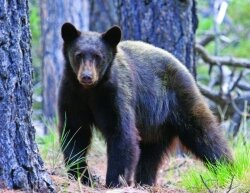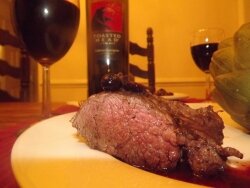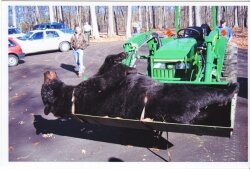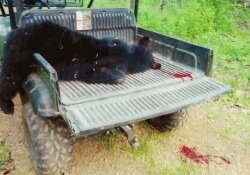Bear Witness: Jackson Landers learns first hand that Virginia is bear central— and they taste good
-
 "Ursus Americanus", the American black bear, is prevalent in Virginia.Flickr/Mark L. Watson
"Ursus Americanus", the American black bear, is prevalent in Virginia.Flickr/Mark L. Watson -
 Jackson Landers typically hunts and eats invasive species— but a roadside ursine encounter took him down a different culinary path.publicity photo
Jackson Landers typically hunts and eats invasive species— but a roadside ursine encounter took him down a different culinary path.publicity photo -
 Bear steak with red wine was a hit.Jackson Landers
Bear steak with red wine was a hit.Jackson Landers -
 In the fall of 2006, an Augusta County man tangled with a 600 pound black bear he'd shot but initially failed to kill. Saved by his hunting companions, his wounds required multiple surgeries.Courtesy Thurman Hensley
In the fall of 2006, an Augusta County man tangled with a 600 pound black bear he'd shot but initially failed to kill. Saved by his hunting companions, his wounds required multiple surgeries.Courtesy Thurman Hensley -
 A rabid bear attacked two groundskeepers on an Afton Mountain estate in spring 2012. Shot with the 20-gauge shotgun the men carried with them, the bear died on the back of the Gator.photo by patrick thompson
A rabid bear attacked two groundskeepers on an Afton Mountain estate in spring 2012. Shot with the 20-gauge shotgun the men carried with them, the bear died on the back of the Gator.photo by patrick thompson
By Jackson Landers
The growl of my truck engine rose an octave as I shifted gears to climb a hill and then began making my way around a bend. The twisty road in the woods of Central Virginia was dappled with late-afternoon sunlight. My mind was on what I would make for dinner— I wondered whether I had any sour cream— until I came around the bend and saw an SUV stopped in the middle of the road. I slammed on my brakes and squealed to a stop.
Moments before I arrived on the scene, the SUV’s driver’s plans for the day had been interrupted by a black bear trotting out in front of her vehicle. She’d hit the bear, wrecking the front end of her SUV in the process. Another vehicle had immediately also clipped the bear, and now all three of us were out of our cars, trying to sort the situation out. The bear and the SUV were the only casualties.
I’m a professional hunting guide, so my first concern was for the bear, which lay dying on its side in the middle of the road. It was struggling to get up with its front paws, but its back legs were clearly paralyzed, and there was no hope for the animal. I put down several wounded deer by the side of the road each year, but I had neglected to stash a spare rifle in my truck that morning. I did, however, have a very large hunting knife. A quick jab in the heart ended the animal’s suffering.
I dragged the bear out of the road so traffic could start moving again, and then I waited for the police to arrive in order to obtain permission to keep the bear. (Being in possession of a dead bear outside of bear-hunting season can get you charged with poaching unless you get special approval.) I had realized that this was as perfect an opportunity as I would ever have to find out what bear meat tastes like.
Disassembling a 150-pound dead bear wasn’t what I’d had planned for the evening (I’d intended to catch up on The Walking Dead), but I’m a carpe diem kind of guy. An hour later I found myself the proud, legal owner of one dead black bear.
Now what?
Black bears look like a cross between humans and big, silly dogs. The idea of eating one had always seemed just shy of cannibalism to me. I hunt deer regularly for food, but I had never eaten–– let alone butchered–– a bear. But is there any good reason the bear should be a sacred cow? Especially a bear that was already dead? There was nothing unethical about eating an animal in this situation, except maybe by the very strictest vegan standards. It wasn’t moral revulsion that I had to get over, exactly–– it was more like neophobia. However, as a hunter and writer specializing in killing and eating invasive species (a great way to eat sustainably and help the ecosystem at the same time), I’ve had to force myself to get over hang-ups about food on many occasions.
Spotting a black bear in the wild is a Facebook-worthy event in Central Virginia. You could live here for your whole life without ever seeing one, yet black bears have almost certainly seen you. Virginia has a population of about 17,000 black bears with some areas of the state supporting one bear for every square mile. Contrast this with our northern neighbor, Maryland, which holds about 600 bears in the entire state. By modern standards, Virginia has a whole lot of bears. Virginia has bears like some places have deer.
It wasn’t always this way. Bears were hunted and commercially trapped with few limits or regulations into the early twentieth century. A conservation movement led by Theodore Roosevelt’s Boone and Crockett Club lobbied for legal limits on hunting and for the protection of habitat from development. Bears were scarce in Virginia by the time protections were put into place. Restricted to a few isolated remnant populations, they had just barely been saved by hunters from hunters.
With hunting regulations finally based on science rather than commerce, Virginia’s bears increased steadily through the twentieth century until they began to explode in the 1980’s. Today we have high numbers of bears everywhere in Virginia except the Northern Neck. For the last decade, Albemarle County has consistently been one of the top counties producing the most black bears during hunting seasons.
Our growing population of black bears has made encounters increasingly common. On July 24th, a woman in Greene County who asked her name be withheld due to legal concerns over a bear shooting witnessed the aftermath of a bear’s raid on her fenced chicken lot.
“We had 12 chickens in a fully enclosed lot, and we came home in the middle of the day and all of our chickens were dead," the woman recalls.
Having ripped open the fence, the bear was reaching for the feathered fowl and fell in, then went on an ersine killing spree before making his escape. The family hadn't seen the last of him.
"The next day he had come back and we actually saw him back in the chicken lot, trying to get out,” the woman says.
But it didn’t end there. The following day, the problem bear returned a third time, surprising the woman’s father-in-law as he walked with her children near the house. Uncharacteristically for a black bear, according to the woman, the animal came straight for them. The man drew a .25 ACP pistol that he was carrying due to the bear’s visits and fired at the bear, which turned and ran out of sight.
Fortunately for those of us here in Bear Central, aka Central Virginia, aggressive behavior by black bears is unusual. Typically, even a mother with cubs will leave the area at the first sight or scent of humans in the area. Wild bears prefer wild food, but bears that rank lower on the pecking order get pushed out of prime habitat and need to seek less-preferred food sources out of trash cans, bird feeders, or chicken coops.
Bears in Central Virginia tend to be healthy. Their only enemies are humans and the only disease that biologists tend to find among them is malnutrition (though there was one unusual case in Albemarle last year of a bear with rabies that attacked a couple of people before being killed). Bear meat from Central Virginia can be presumed safe to eat, but its best to cook the meat to 160 degrees just in case.
The butchering of my own bear was easier than I had expected. With the exception of removing the paws, it wasn’t much different from working on a deer. The fur was longer and thicker, but the hide wasn’t much tougher. The bone structure of the lower limbs was radically different, though: The bones were much thicker, and they were surrounded by numerous broad sinews. Everything in those limbs communicated power–while also reminding me a bit of human anatomy. Within a few hours I had a fridge full of around 60 pounds of bear meat.
Now I had heard all sorts of stories from hunters about what bear meat is like: that it’s tough, gamey, and unpleasantly greasy. But in my experience eating a fairly wide array of unusual species, I had found that meat that tastes “tough and gamey” is more often a case of bad butchering and sloppy handling than an intrinsic quality of a species.
To maximize the potential flavor of my bear, I dry-aged it for a week before I started experimenting. Dry-aging meat, for the uninitiated, is the process of letting meat hang out for a while at cool temperatures while allowing moisture to evaporate from it. Dry-aging accomplishes two things. First, natural enzymes in the meat begin to tenderize it by breaking down the collagen in the muscles. (Collagen is what makes tough meat feel tough, and more of it builds up in muscle tissue as an animal gets older.) Second, dry-aging allows water to evaporate out of a piece of meat, concentrating the flavor. High-end steakhouses all do this with their beef, and I have been dry-aging most of my venison in my fridge at home for years.
Once my bear was sufficiently dry-aged, the very first thing I tried was cutting some simple steaks out of a forequarter (the upper portions of the front legs) and from the backstraps (the cuts from alongside the spine that are referred to as “pork loin” in pigs). I wanted to keep the recipe simple so as not to hide the true flavor of the meat, but I also wanted to have some fun. So I just ran with the bear theme. I pan-seared the steaks in olive oil and drizzled just a bit of honey on them. A handful of blueberries went into the pan with them (bears love blueberries almost as much as they love honey, and tradition suggests seasoning wild game with it's favorite eats). Then I transferred the meat to a covered dish to finish cooking in the oven and deglazed the pan with a splash of Toasted Head cabernet sauvignon, which I had chosen on account of the wine’s label having a black bear on it. I made sure to cook the meat to 140 degrees and hold it there for a while, since bears, like pigs, can carry trichinosis.
My girlfriend and I sat down to eat our first bites of bear meat, drizzled with that red-wine pan sauce. The texture was good, and the backstrap cuts were a bit more tender than the forequarter cuts. The flavor was mild; it tasted more or less identical to venison—which is to say a lot like beef, only with less fat and a blander flavor. There was nothing greasy or tough about it. It looked like a thick piece of filet mignon. Between sips of the bear-bearing Toasted Head wine (which paired very nicely with the bear meat, I should add), we soon forgot that it was bear meat that we were eating. By the end of the meal, it was just dinner, no more exotic than the artichokes we served along with it.
Heartened, I started putting bear meat in everything. And once I began running it through the meat grinder, the stuff became a household staple. Think bear tacos, spaghetti with bear sauce, lime-marinated bear stir-fry served over ramen noodles.
Bear burgers in particular were a big hit. I mixed one egg with one pound of ground bear meat and just a touch of onion powder and pepper and broiled them under high heat. Three minutes per side seemed to get me up over 140 degrees every time, without taking the burgers beyond medium-rare. I invited some friends over to eat them, and the unanimous agreement was that they simply tasted like very good beef burgers and that nobody would ever guess they were bear.
I began to take the ground bear meat so much for granted that I confess to feeding it to a dinner guest in a ragout over angel hair pasta without thinking to tell her that she was eating bear as opposed to beef. She ate every bite. I’m still not sure whether I should tell her what she ate.
Lately I’ve found myself worrying about the dwindling supply of bear meat in my fridge and freezer. I have one whole hindquarter in my chest freezer awaiting a special bear dinner with a group of friends, but other than that and a pound or so of medallions, all I’ve got left is an array of very unusual bones that my dogs have been chewing on in the front yard. What will I do when I run out?
I’ve hesitated to take up bear-hunting in spite of the high numbers of black bears here in my home state of Virginia. As a dog owner, I’m disinclined to shoot them on account of their canine resemblance. But I realize that this is more about me than it is about the animal. Either I’ll have to get over my reluctance to actually hunt bears, or I should spend less time with my rifle in the woods and more time cruising for roadkill.
~
Jackson Landers is the author of Eating Aliens: One Man's Adventures Hunting Invasive Animal Species. He lives in Albemarle County. A version of this story was originally published on Slate.com.
27 comments
You might have written it, but some people gave you some help.
No thanks. Too fruity.
You may want to fix the byline. The story doesn't make sense if it's written by Courtney Stuart.
If you have pesky bears and you want to get rid of them toss out some black cat firecrackers when they are present and they will never return.
One I can call by her first name. The other I should call by her title. I'll try to remember who is who from now on.
Byline fixed. Thanks for the alert. -- Courteney Stuart
If you take the time cut out all fat, bear meat is good. Don't take the time and its like eating a piece of meat rolled in tallow. I bet they're better when they aren't fattened up as much this time of year.
I beg to differ, Wisconsin is bear central. The DNR is very slow to issue bear tags so the population multiplies rapidly. They are getting very large, not uncommon to see 400 and 500 lb animals.
I suspect the reason the DNR does not issue enough tags is that bear will eat newborn fawns and the auto insurance companies are lobbying the cause to reduce the deer population.
Just a guess but no other reason exists. Crop damage is expensive and I have heard many stories of hunters applying for years before getting a tag.
Ken, I imagine that anyone who is able to calculate whether bears cause more damage to crops by consuming them than they prevent by consuming deer fawns must be a far better scientist than I.
Great article Jackson. Bear is good food! I am not against hunting, but I would like to see bear hunting with dogs made illegal. Last year, a White Hall area hunter lost two lovely hound dogs who had cornered an exhausted bear who then crushed their skulls with a swat of her massive paw. Is this really how we want our dogs' lives to end? Shoot the bears if you must; track them with a hound if you will; but isn't it time we put an end to pack hunting bear?
They ain't never caught a rabbit so why be sad when someone smacks them upside the head? In other words, what makes the dogs more special than the bear? Maybe if you were Chinese you would feel differently about things. (Not that I'm Chinese or anything, I've just heard they enjoy dog meat). Is Bigfoot now sharing Sugar Hollow with Panda bears? Maybe they're finally learning to not be so picky about what they eat.
I'm sorry if I offended or hurt anyone's feelings. Dog is man's best friend and we all should treat dogs with respect. I don't know if putting them in danger for our own benefit qualifies as such but if they have the courage and desire to put themselves in harm's way for our sake I guess it's ok to let them. I don't eat bear meat but I do take fish oil. But enough about me!
jackson, we had a big old black bear on our farm here in the northern neck last summer. they are working their way down here from SNP. great piece. thanks.
Hmmmmm ... I wonder if anyone is awake at The Hook and has noticed that there has been an arrest in the Alexia Murphy case???? People who are worried about Miss Murphy and her family don't care as much about bears. It's happens to be one of their front page interviewees from last fall that has been arrested, so that might be a little embarrasing.
As noted previously, a healthy bear taken during season is hugely marbled with fat. Greasy meat that requires rending. Interesting that an active bear would be so different. And the aversion to eating bear? There truly is no more disgusting meat than pig - sweet, greasy meat.
If I encounter a bear, I want to make it go away, not eat it.
One guy who hikes the Appalachian Trail said that an airhorn (like boats use) made a bear run away when it was up against his tent and growling.
Hang it in a tree
BIgfoot and Blackfoot
She suggested I shut up and I did for the most part
I went completely crAZY!
That would have made more sense but the Paul Hogan reference wouldn't have worked
Full service
It's all a big setup
Didn't leave a tip
I paid for a little bit of it myself
He's on colored people time
Geez